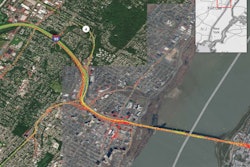A new study released by the American Transportation Research Institute examines how improving the nation’s worst traffic bottlenecks would cut down on fuel consumption and emissions and save billions of dollars for the trucking industry.
Previous research by the group found that 89 percent of the industry’s congestion costs stem from just 12 percent of interstate highway miles. The new study, part of ATRI’s “Fixing the 12%” research initiative, focuses on how reducing congestion on those miles could cut costs for trucking companies.
ATRI estimates that congestion across the U.S. increased trucking’s fuel consumption by 6.87 billion gallons in 2016, adding an additional $15.74 billion to the industry’s fuel bill, based on 2016’s diesel prices.
The new analysis looks specifically at the I-285/I-85 interchange in Atlanta, known as “Spaghetti Junction,” which is consistently ranked by the group as one of the worst trucking bottlenecks in the U.S. The study found that if just this interchange was improved to be more free-flowing, with average vehicle speeds of 55 miles per hour, diesel vehicles traveling through the intersection would see a nearly 11 percent increase in fuel economy, saving 1.6 million gallons of diesel per year.
Beyond fuel savings, the study also found that trucks traveling through the intersection would see estimated reductions in emissions of 17 percent for fine particulate matter, 5.5 percent for smog-forming nitrous oxide emissions and 8 percent for carbon dioxide emissions.










